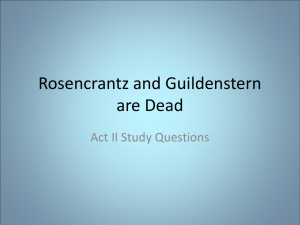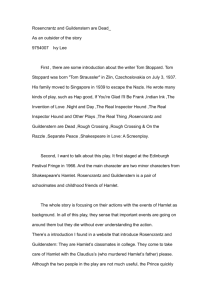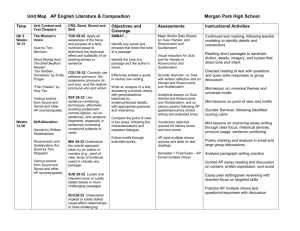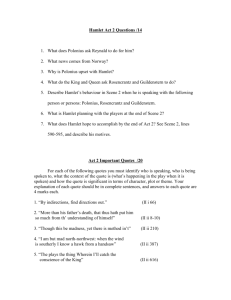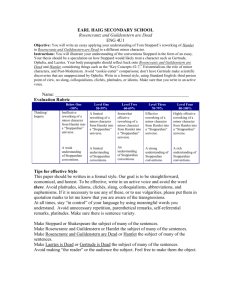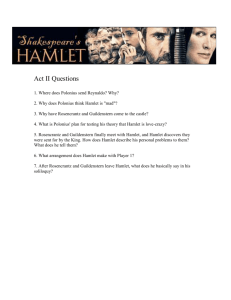Rosencrantz and Guildenstern Are Dead Worksheet
advertisement
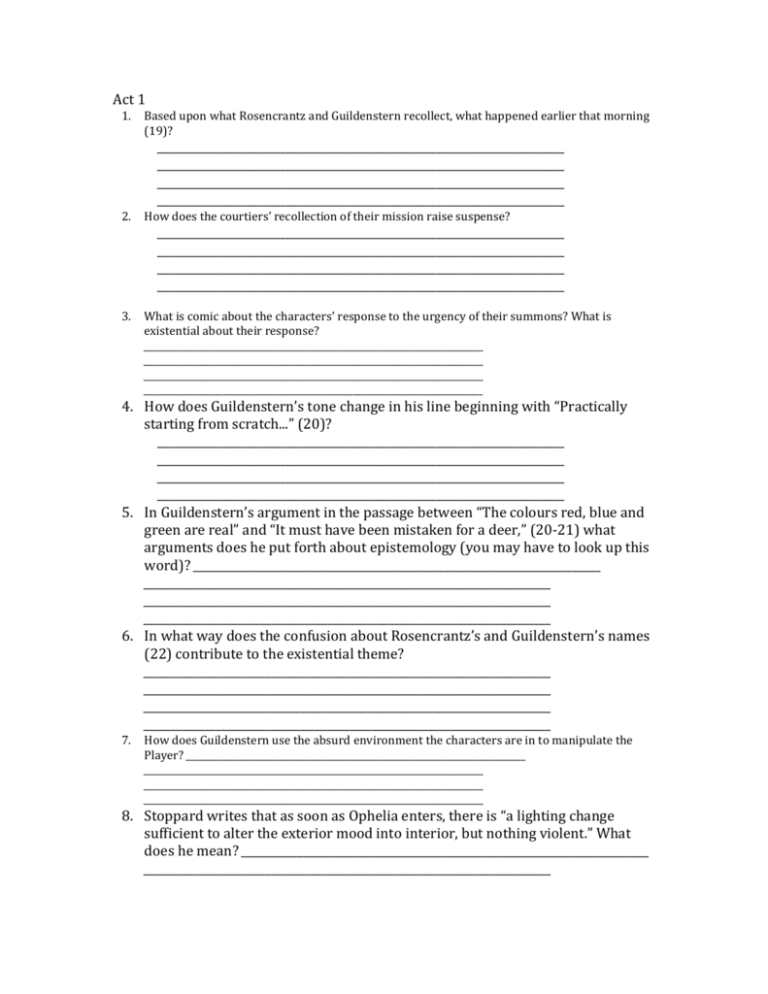
Act 1 1. Based upon what Rosencrantz and Guildenstern recollect, what happened earlier that morning (19)? _________________________________________________________________________ _________________________________________________________________________ _________________________________________________________________________ _________________________________________________________________________ 2. How does the courtiers’ recollection of their mission raise suspense? _________________________________________________________________________ _________________________________________________________________________ _________________________________________________________________________ _________________________________________________________________________ 3. What is comic about the characters’ response to the urgency of their summons? What is existential about their response? _________________________________________________________________________ _________________________________________________________________________ _________________________________________________________________________ _________________________________________________________________________ 4. How does Guildenstern’s tone change in his line beginning with “Practically starting from scratch...” (20)? _________________________________________________________________________ _________________________________________________________________________ _________________________________________________________________________ _________________________________________________________________________ 5. In Guildenstern’s argument in the passage between “The colours red, blue and green are real” and “It must have been mistaken for a deer,” (20-21) what arguments does he put forth about epistemology (you may have to look up this word)? _________________________________________________________________________ _________________________________________________________________________ _________________________________________________________________________ _________________________________________________________________________ 6. In what way does the confusion about Rosencrantz’s and Guildenstern’s names (22) contribute to the existential theme? _________________________________________________________________________ _________________________________________________________________________ _________________________________________________________________________ _________________________________________________________________________ 7. How does Guildenstern use the absurd environment the characters are in to manipulate the Player? _________________________________________________________________________ _________________________________________________________________________ _________________________________________________________________________ _________________________________________________________________________ 8. Stoppard writes that as soon as Ophelia enters, there is “a lighting change sufficient to alter the exterior mood into interior, but nothing violent.” What does he mean? _________________________________________________________________________ _________________________________________________________________________ _________________________________________________________________________ _________________________________________________________________________ 9. What effects are created by Stoppard’s quoting passages verbatim from Shakespeare’s Hamlet (3536)?_________________________________________________________________________ _________________________________________________________________________ _________________________________________________________________________ _________________________________________________________________________ 10. What is ironic about Rosencrantz’s remark that it is “all stopping to a death, it’s boding to a depth, stepping to a head, it’s all heading to a dead stop—” (38)? _________________________________________________________________________ _________________________________________________________________________ _________________________________________________________________________ _________________________________________________________________________ 11. What does the stage note next to Guildenstern’s reply indicate about his tone? _________________________________________________________________________ _________________________________________________________________________ _________________________________________________________________________ _________________________________________________________________________ 12. How does Guildenstern explain truth in the passage between “You did, the trouble is...” and “we are presented with alternatives” (38-39)? _________________________________________________________________________ _________________________________________________________________________ _________________________________________________________________________ _________________________________________________________________________ 13. To what does Guildenstern allude when he says, “Words, words”(41)? _________________________________________________________________________ _________________________________________________________________________ _________________________________________________________________________ _________________________________________________________________________ 14. How does the question game contribute to the existentialist framework? _________________________________________________________________________ _________________________________________________________________________ _________________________________________________________________________ _________________________________________________________________________ _________________________________________________________________________ _________________________________________________________________________ _________________________________________________________________________ _________________________________________________________________________ 15. In what way is Rosencrantz’s questioning of Guildenstern—portraying Hamlet—an example of dramatic irony? _________________________________________________________________________ _________________________________________________________________________ _________________________________________________________________________ _________________________________________________________________________ Act Two 1. What does Hamlet mean when he says, “Let me comply with you in this garb, lest my extent to the players (which I tell you must show fairly outwards) should more appear like entertainment than yours” (55)? _________________________________________________________________________ _________________________________________________________________________ _________________________________________________________________________ _________________________________________________________________________ 2. Why is this statement ironic? _________________________________________________________________________ _________________________________________________________________________ _________________________________________________________________________ _________________________________________________________________________ 3. In this particular scene, some lines of the original text are omitted, following Hamlet’s statement, “The great baby you see there is not yet out of his swaddling clouts...” (55) Rosencrantz: Happily he’s the second time come to them; for they say an old man is twice a child. Hamlet: I will prophesy he comes to tell me of the players; mark it—You say right, sir: o’ Monday morning; ’t was so indeed. Why might Stoppard have intentionally eliminated these lines? _________________________________________________________________________ _________________________________________________________________________ _________________________________________________________________________ _________________________________________________________________________ 4. Why is Rosencrantz’s repeated line “He murdered us,” (56)significant? _________________________________________________________________________ _________________________________________________________________________ _________________________________________________________________________ _________________________________________________________________________ 5. How would the audience explain why Rosencrantz and Guildenstern cannot determine “which way they c[a]me in” (58)? _________________________________________________________________________ _________________________________________________________________________ _________________________________________________________________________ _________________________________________________________________________ 6. How might the placement of Rosencrantz and Guildenstern, as discussed in the previous question, illustrate an existential idea? _________________________________________________________________________ _________________________________________________________________________ _________________________________________________________________________ _________________________________________________________________________ 7. How do Guildenstern’s ideas in the passage beginning with “Wheels have been set in motion...” reveal his existential angst? _________________________________________________________________________ _________________________________________________________________________ _________________________________________________________________________ _________________________________________________________________________ 8. What problem did the Chairman of the T’ang Dynasty face (60)? _________________________________________________________________________ _________________________________________________________________________ _________________________________________________________________________ _________________________________________________________________________ 9. What is significant about Guildenstern’s statement, “Envy him; in his two-fold security”? _________________________________________________________________________ _________________________________________________________________________ _________________________________________________________________________ _________________________________________________________________________ 10. How does Rosencrantz’s yelling the word “fire” (60) define the boundary between the play and the theater? Is this an example of metafiction? _________________________________________________________________________ _________________________________________________________________________ _________________________________________________________________________ _________________________________________________________________________ 11. How is the Player’s presence in this scene an example of dramatic irony? _________________________________________________________________________ _________________________________________________________________________ _________________________________________________________________________ _________________________________________________________________________ 12. What advice does the Player give Rosencrantz and Guildenstern on how to live their lives? _________________________________________________________________________ _________________________________________________________________________ _________________________________________________________________________ _________________________________________________________________________ 13. What words in the Player’s statement “The old man thinks he’s in love with his daughter” (68) create ambiguity, and what are three possible interpretations of this line? _________________________________________________________________________ _________________________________________________________________________ _________________________________________________________________________ _________________________________________________________________________ 14. Why does Rosencrantz believe it is pointless to be depressed by the thought of being dead and buried in a coffin (71)? _________________________________________________________________________ _________________________________________________________________________ _________________________________________________________________________ _________________________________________________________________________ 15. Where in Rosencrantz’s argument does he make a mistake in his reasoning and regain his anxiety about postmortem burial? _________________________________________________________________________ _________________________________________________________________________ _________________________________________________________________________ _________________________________________________________________________ 16. Why does Rosencrantz argue that being buried alive is better than being dead? _________________________________________________________________________ _________________________________________________________________________ _________________________________________________________________________ _________________________________________________________________________ 17. To what are the stage directions referring when they say that Hamlet is “weighing up the pros and cons of making his quietus.” (74)_________________________________________________________________________ _________________________________________________________________________ _________________________________________________________________________ _________________________________________________________________________ 18. Why does Rosencrantz put his hand under the Player’s foot (76)? What might this act of “absurdity” illustrate? _________________________________________________________________________ _________________________________________________________________________ _________________________________________________________________________ _________________________________________________________________________ 19. How is the Player’s discussion of tragedy an example of dramatic irony (80)? _________________________________________________________________________ _________________________________________________________________________ _________________________________________________________________________ _________________________________________________________________________ 20. Who are the two accomplices that the Poisoner dispatches to England with Lucianus? How do you know? _________________________________________________________________________ _________________________________________________________________________ _________________________________________________________________________ _________________________________________________________________________ 21. According to the Player, why did the audience not respond to the live hanging on stage (84)? _________________________________________________________________________ _________________________________________________________________________ _________________________________________________________________________ _________________________________________________________________________ 22. What does the Player say about the realism and believability of art? Why might this idea be true (84)? _________________________________________________________________________ _________________________________________________________________________ _________________________________________________________________________ _________________________________________________________________________ 23. In the context of the play, why is Guildenstern incorrect when he claims that people learn by experience? _________________________________________________________________________ _________________________________________________________________________ _________________________________________________________________________ _________________________________________________________________________ 24. How does Hamlet compare Rosencrantz to both a sponge and a nut in an ape’s mouth? What idea unites the metaphor and simile? _________________________________________________________________________ _________________________________________________________________________ _________________________________________________________________________ _________________________________________________________________________
